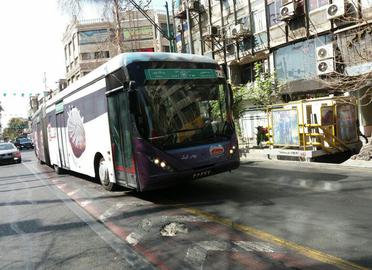When Robabeh Rezaei visited her husband in prison on Wednesday, September 13, she had a special message for him. Earlier that day, drivers from the Tehran Unified Bus Company (TUBC) had turned on their headlights and driven at a speed of only 20 kilometers per to to raise awareness about their imprisoned co-worker Reza Shahabi.
For more than a month, the labor activist has been on a hunger strike at Rajaei Shahr Prison near Tehran. He has also refused any medicine. On Wednesday, prison officials agreed to allow his family to visit. Shahabi’s wife told him that his friends were making his voice heard. “Reza is doing very badly,” she said. “He has lost 13 kilos, his sugar level has fallen and his blood pressure has risen. He suffers from severe stomach pain and the left side of his body prickles. His feet have lost sense and his waist hurts. The doctor has said that if the hunger strike continues for a few more days, his spinal cord might get damaged.”
But when he heard that other bus drivers were spreading his message across Tehran, he was very happy. “He came to believe that his friends had not forgotten him,” his wife said.
Reza Shahabi, a 45-year-old driver and trade unionist, was the treasurer of the Union of the Workers of Tehran Unified Bus Company when he was arrested on June 12, 2010 and charged with “propaganda against the regime” and “gathering and collusion with the aim of committing acts against national security.” In April 2012, the Revolutionary Court Judge Abolghasem Salavati sentenced him to six years in prison and banned him from public activity for five years. Salavati is notorious for violating the rights of defendants and handing down harsh verdicts against peaceful civil activists.
On October 6, 2014, after repeated hunger strikes during his incarceration at Evin and Rajaei Shahr prisons, Shahabi was given a medical leave of absence after he posted a bail of 300 million tomans — close to $90,000.
“When Reza started his leave of absence they said he was practically free,” his wife says, “because the remainder of his sentence was the same length as his furlough. During this time we went to the official medical examiner several times and after examining him they [said they] would write a letter and extend his leave of absence.”
What Leave of Absence?
But recently, the judiciary contacted the bondsman and told him that unless Shahabi returned to prison, his bond would be forfeited. “A few times we inquired about it at the prosecutor’s office,” says Ms. Rezaei. “They said that three months of his sentence remained and the letter by the medical examiner giving him a three-month leave of absence was not in his case file, so he had to return to prison. Reza returned to prison to release the bond. He said that people’s property must be released and that he would serve the three months until it was all over.”
But when he returned to prison, he found out that he had to serve five months instead of three. What is more, he had been sentenced to an extra year in jail and, therefore had to remain in prison for another 17 months.
Authorities added the additional year to Shahabi's sentence in direct retaliation for the events of “Black Thursday.” On April 17, 2014, political prisoners and prisoners of conscience at Ward 350 of Iran’s Evin Prison staged a protest calling for prisoners to be allowed to be present when guards inspected their cells on a monthly basis. Shahabi was among the protesting prisoners, who were then subjected to assault, beatings and other ill-treatment. Some of those injured were denied access to adequate medical care, including Shahabi. Later in the same year, he was summoned to the prosecutor’s office at Evin Prison and was interrogated even though he was on furlough. In the spring of 2015 the court sentenced him to one year extra in prison without notifying him. “Reza says that this verdict is unjust,” reported his wife, “ and that he will stay on his hunger strike until the verdict is overturned.”
I spoke to Ali, a driver for Tehran Rapid Bus Transit (BRT). He was one of many drivers who took part in the civil action on Wednesday and drove his bus at 20 kilometers per hour with the headlights on. “Reza had been treated very unjustly,” he told IranWire. “People did not understand why the buses were not moving. A number of social activists and students were helping us by explaining to people who Reza Shahrabi is and what it was all about. Many people had not heard of Reza and his troubles.”
Ali said the protest got attention, although not everyone was supportive. “Some people were only thinking about themselves,” he said. “They were worried about being late to their destination or that they were standing in line for too long. But many people were sympathetic.”
He said that after bus drivers turned on their headlights, the bus company’s patrol cars arrived and instructed drivers that they were no longer working that shift. But the drivers did not give in — many continued their protests. “I saw that some of the fellows stuck trade union leaflets about turning on headlights and driving at 20km on the windshields of the bus company’s patrol cars,” said Ali. “It was a funny scene. They were patrolling to prevent the drivers from joining the protest but the drivers were inviting them to join the protest.”
According to Ali, the bus company’s security personnel prohibited a number of known union members from driving buses on Wednesday. “But many joined the protest and many people learned about Reza and the injustice done to him,” he said.
Last week, a large group of bus drivers joined Reza Shahabi’s family to protest outside parliament. His wife Robabeh Rezaei organized the event. “We were under the impression that the parliament is the people’s house,” said Ali, “but they treated the participants in the rally very badly. The police dispersed us violently.”
International Pleas to Save Shahabi
It is not often that the world hears about the troubles of Iranian workers, but the treatment of this labor activist has led to international condemnations and calls for his release.
On August 12, in an open letter to President Rouhani, International Trade Union Confederation (ITUC) General Secretary Sharan Burrow demanded the immediate and unconditional release of Reza Shahabi. “The prosecutor’s assertion that Shahabi must spend five more months to complete his six-year prison term is unfounded because after he returned to prison he saw a letter from the judiciary which stated that his sentence terminated on September 9, 2015,” said the statement. “Keeping Reza Shahabi behind bars is against Iran’s international commitments, which prohibit detaining labor activists who are peacefully campaigning for workers’ rights”.
On September 5, IndustriALL Global Union sent a letter to President Rouhani, demanding an end to the repression of trade unionists, and calling for the release of Reza Shahabi and Esmail Abdi, an imprisoned teachers’ union leader who is also on hunger strike.
On September 14, Five French labor syndicates, together with Amnesty International, called on the French President Emanuel Macron to intervene to protect Reza Shahabi.
“I hope the authorities hear Reza’s voice and change the unjust verdict against him before it is too late,” his wife Robabeh Rezaei says.
She is due to visit her husband again next Wednesday. Perhaps her hopes will be realized. In the meantime, she waits, and the next fews days will no doubt be extremely difficult.
visit the accountability section
In this section of Iran Wire, you can contact the officials and launch your campaign for various problems



























comments